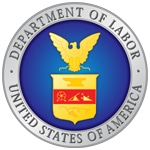
Advisory on Union Officer Elections and Public Disclosure Reporting in Areas Affected by the Coronavirus (COVID-19)
 Due to the Coronavirus (COVID-19), the Department of Labor’s Office of Labor-Management Standards (OLMS) issues this advisory regarding the labor union officer election requirements under Title IV and the reporting requirements of Title II of the Labor-Management Reporting and Disclosure Act of 1959 (LMRDA). OLMS recognizes that due to the disruption caused by COVID-19, it may be difficult or impossible for some unions to conduct timely union officer elections. Similar difficulties may confront unions, labor relations consultants, and employers faced with public disclosure filing requirements. OLMS issues this advisory for those unions, employers, or labor relations consultants affected by COVID-19.
Due to the Coronavirus (COVID-19), the Department of Labor’s Office of Labor-Management Standards (OLMS) issues this advisory regarding the labor union officer election requirements under Title IV and the reporting requirements of Title II of the Labor-Management Reporting and Disclosure Act of 1959 (LMRDA). OLMS recognizes that due to the disruption caused by COVID-19, it may be difficult or impossible for some unions to conduct timely union officer elections. Similar difficulties may confront unions, labor relations consultants, and employers faced with public disclosure filing requirements. OLMS issues this advisory for those unions, employers, or labor relations consultants affected by COVID-19.
Elections: The LMRDA requires that all national and international labor unions elect their officers not less often than every five years. Officers of intermediate bodies, such as general committees, system boards, joint boards, joint councils, conferences, and certain districts, district councils and similar organizations, must be elected at least every four years, and officers of local labor unions not less often than every three years. See the OLMS Electing Union Officers publication for further information.
Labor unions affected by COVID-19 must still make a good faith effort to conduct officer elections within LMRDA timeframes. OLMS has jurisdiction to file a civil enforcement action concerning a failure to hold a timely election after receipt of a complaint from a union member who has first sought a remedy from his or her union. If OLMS receives a complaint from a union member solely regarding a union’s failure to hold an election within the LMRDA timeframes, but the election has been completed prior to OLMS receipt of the complaint, then OLMS will take no enforcement action. If OLMS receives a complaint regarding a union’s ongoing failure to hold an election, and that failure was attributable to COVID-19, OLMS will promptly seek a voluntary compliance agreement with the union. The agreement would require the union to hold the election when practicable on a date certain. With such an agreement, OLMS will not seek a civil enforcement action based on the complaint, provided the election is held in conformance with the agreement.
Public Disclosure Reports (LM reports): Labor unions, labor relations consultants, and employers affected by COVID-19 must make a good faith effort to file required public disclosure reports. The failure to file a timely and complete report is an ongoing violation of the LMRDA. OLMS has jurisdiction to file a civil enforcement action concerning a failure to meet reporting requirements. OLMS will not, however, pursue a civil enforcement action with regard to a delinquent or deficient report when these reporting violations are attributable to COVID-19. Unions, employers, and labor relations consultants wishing to take advantage of this enforcement policy should contact OLMS before the report is due, describe the circumstances necessitating additional time, and provide a date certain by which the report can reasonably be submitted. Under these circumstances, OLMS will not lodge a civil enforcement action to obtain the delinquent or deficient report. Unless an extension is granted, LM reports are due by March 31, 2020.
Related News
- Operation Lifesaver campaigns to promote rail safety in 11 states
- New TD Crew Room Flyers Available
- Colorado bill criminalizing transit assault one step closer to becoming law
- Honoring the Legacy of Brother John A. Saunders
- Colorado Transit Worker Safety Bill (House Bill 25-1290)
- Kansas funds passenger rail expansion
- Maryland Passes Monumental Transit Safety Bill
- Brother Wirth Crowned Champion in 168-Pound Masters Division Victory
- Chairman Pauli Announces Retirement, SMART-TD celebrates his career
- New Mexico Local 1687 sets new precedent with Red Apple Transit